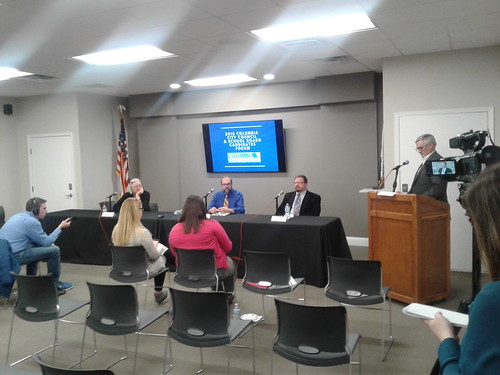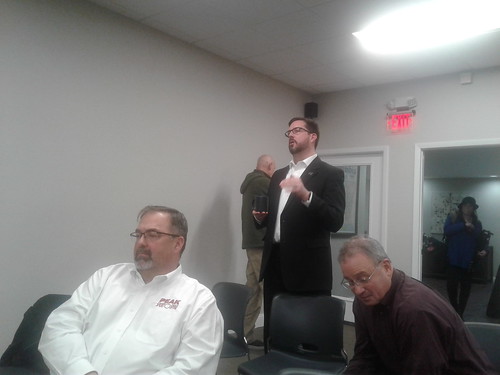 Tough crowd, hard questions
Tough crowd, hard questions
COLUMBIA, Mo 2/2/18 (Beat Byte) -- Surprising fireworks highlighted last night's
Columbia Board of Realtors City Council candidate forum.
Second Ward hopeful
Paul Love and incumbent
Mike Trapp battled over TIF, public safety, ethics, and city manager
Mike Matthes' job performance.
In a
devastating assessment of the Columbia Police Department to which he belonged until recently, Columbia Board of Realtors president
Sean Moore delivered the night's most powerful pleadings.
An audience member
called out Mr. Trapp and Sixth Ward Councilwoman Betsy Peters (running unopposed) for their votes to spend $1.1 million from the city's General Fund, used for public safety, on a
new park at the corner of Providence and Broadway.
"You should have used Parks money for that," she explained, elaborating on "the promise" public officials make when they collect taxes for specific purposes. "
How can we trust you with our money if you don't do what you promise?" she asked. "I'm hurt by what you did. I'm personally offended."
Earlier, Fourth Ward Councilman
Ian Thomas also
criticized the park funding source.
The claim baffled Ms. Peters, who couldn't remember details of the purchase. Mr. Trapp said he
would have "voted differently" now.
Mr. Love was "astonished" that a few minutes earlier, both
Mr. Trapp and Ms. Peters said they wanted to raise property taxes to pay for more police. That suggestion brought audience groans several times during the debate.
Love criticized the park for its location near a "well-known homeless camp," and a cost that "will probably hit three million dollars. For one thing, there's a
building on the property that's full of asbestos."
Sounds from the audience indicated many people could not understand how City Hall could spend taxpayer money so freely, on everything from the park to the $5 million in tax giveaways Broadway Hotel owner
Dave Parmley has received in two TIF incentives.
Moderator
David Lile wanted to know why Mr. Trapp and Ms. Peters
supported Parmley's second TIF when every other public deliberative body -- the TIF Commission, the Library Board, the School Board -- opposed it.
Love thought Trapp should have abstained from voting for something
"his boss wanted," a reference to Parmley's position on the
Downtown Community Improvement District (CID) Board of Directors.
Mr. Trapp has a
$100/hour consulting job from the CID interviewing downtown homeless persons, Love added, noting that he could not understand the TIF vote either. "In case you haven't noticed, hotels are going up all over the city without taxpayer help," he said. "The Broadway is in a prime location."
Mr. Trapp consumed his alloted three minutes playing defense. "I have a right to make a living.
We're only paid $6,000 a year," he replied.
The insinuation he had a conflict of interest was "uncalled for, unfair, false, and typical" of Mr. Love, who had a "history of" saying such things, Mr. Trapp said. Love and Trapp squared off three years ago for the 2nd Ward slot.
Mr. Love was undeterred,
hammering home a forceful case for why Mr. Trapp is the wrong person for the job. "I don't want a City Councilperson who wants unanimity, to go along with 'the management'," a position Mr. Trapp said he supports, Love explained. "I want a City Councilperson who will at least show up with a pencil and paper to take notes.
I want a City Councilperson who will stand up for me and ask questions."
"Whining, complaining, and attacking are easy," Mr. Trapp said. "Making the tough decisions, considering all sides," is the hard part.
Builder
Rhonda Carlson defended Mr. Trapp, thanking him for listening, availability, and well-considered decisions. She spoke about a meeting with a consultant about power transmission that
Councilman Thomas "hijacked," Betsy Peters told the audience.
"Ian substituted his white paper for the consultant's recommendations," Mr. Trapp added,
grumbling that Thomas needed to "listen more." 
The evening's final question came from Moore, a veteran full-time and reserve police officer.
More money, more staff, and less duty to "solve the Columbia police morale problem
will not work," he said. Morale is so poor, officers use a phone app to count down their days to retirement.
It was "ridiculous," Moore explained, to ignore the elephant in the room, the "toxic leadership" pulling down a department that just ten years ago was the pride of the nation, with "750 applications for three positions."
"I remember that," Love interjected. "When the FBI, CIA, and other national law enforcement recruited from our police department."
Matthes and Chief Ken Burton "have poisoned the police department," Moore said loudly from the back of the room, after Lile asked him to clarify. Instead of promoting the best and brightest, Chief Burton ran them off, Moore said. "All the ethical, moral, high-performing people got the hell out," he explained. "But nobody will talk about this. Nobody wants to deal with it."
"We can't just fire the Chief," Mr. Trapp said, referencing state law that grants tenure-like job security. Matthes, meanwhile, "has proven himself to be an excellent leader," he said.
"I feel traumatized by the fact that our public safety personnel are operating in such a low-morale environment," Mr. Love explained. Before raising property taxes to pay for more cops, improving morale, retention, and job satisfaction "has to happen," he said. "You lose a tremendous amount of efficiency when people hate their jobs."
At evening's end, Ms. Peters and Mr. Trapp had mostly retreated. She had little to say in defense of either Burton or Matthes "who just got a $15,000/year raise from you guys," Love said. She could not understand charges of mismanaged public funds.
From his previously bold elocution, Mr. Trapp dropped his voice so low audience members in the back had trouble hearing him. As one of the longest-serving Council members currently in office, who has shown a strong grasp of the issues and a willingness to listen, Mr. Trapp said he deserved a third term.
Tough crowd, hard questions
COLUMBIA, Mo 2/2/18 (Beat Byte) -- Surprising fireworks highlighted last night's Columbia Board of Realtors City Council candidate forum.